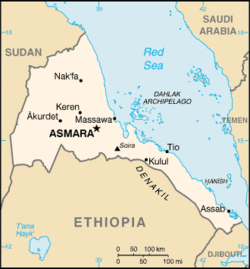| UN Security Council Resolution 1907 | ||
|---|---|---|
 Eritrea | ||
| Date | 23 December 2009 | |
| Meeting no. | 6,254 | |
| Code | S/RES/1907 (Document) | |
| Subject | Peace and security in Africa | |
Voting summary |
| |
| Result | Adopted | |
| Security Council composition | ||
Permanent members | ||
Non-permanent members | ||
| ||
United Nations Security Council Resolution 1907, adopted on December 23, 2009, imposed an arms embargo on Eritrea, travel bans on its leaders, and froze the assets of some of the country's political and military officials after accusing the Eritrean government of aiding Al-Shabaab in Somalia and reportedly refusing to withdraw troops from its disputed border with Djibouti, following a conflict in 2008. [1] The African Union and other organisations had been calling on the Security Council to sanction Eritrea for several months. [1]
Contents
The resolution was tabled by Uganda, and Burkina Faso led the proceeding. It was adopted by 13 votes in favor, with Libya voting against and one abstention from China. [1] Both countries said that sanctions were not an effective method for reconciliation. [2]
Eritrean Ambassador Araya Desta condemned the resolution, calling it "shameful" and a "fabrication of lies" by the United States and "Ethiopian regime", and stated it would not affect the country. He also denied Eritrean support of Somali militants, stating that "Somalis are our brothers". [3] [4] At the same time, ambassadors from Somalia and Djibouti strongly supported the outcome. [5]
The African Union, an ardent supporter of the Somali government, had called on the Security Council to impose the sanctions. Eritrea withdrew from the African Union in protest.[ citation needed ]